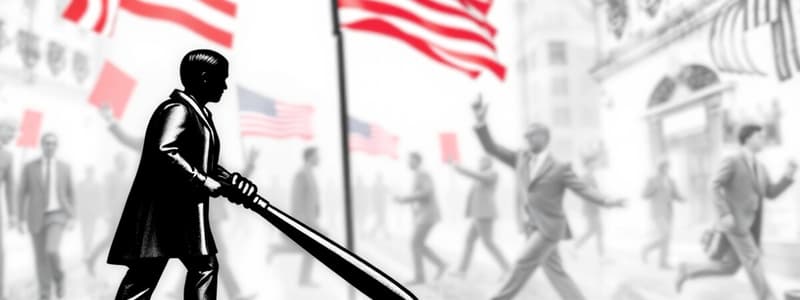Podcast
Questions and Answers
What is the primary purpose of U.S. antitrust laws?
What is the primary purpose of U.S. antitrust laws?
- To regulate international trade and set global pricing standards.
- To ensure that all businesses, regardless of size, can charge the same prices for their products.
- To promote monopolies and protect established firms from competition.
- To prevent practices that reduce competition, such as cartels and anticompetitive mergers. (correct)
Which of the following actions is explicitly illegal under U.S. antitrust laws?
Which of the following actions is explicitly illegal under U.S. antitrust laws?
- A manufacturer suggesting a resale price to its dealers.
- Competitors forming a cartel to fix prices. (correct)
- A business briefly lowering prices below cost to attract new customers.
- A company offering discounts to customers who buy products in bulk.
Which entities are primarily responsible for enforcing antitrust laws in the United States?
Which entities are primarily responsible for enforcing antitrust laws in the United States?
- The Supreme Court and the White House.
- The Federal Trade Commission (FTC) and the U.S. Department of Justice (DOJ). (correct)
- The Securities and Exchange Commission (SEC) and the Environmental Protection Agency (EPA).
- The Federal Reserve and the Internal Revenue Service.
In the context of antitrust law, what does 'tying sales' refer to?
In the context of antitrust law, what does 'tying sales' refer to?
What is a key characteristic that distinguishes predatory pricing from normal market competition?
What is a key characteristic that distinguishes predatory pricing from normal market competition?
Why are minimum resale price maintenance agreements generally considered restrictive practices?
Why are minimum resale price maintenance agreements generally considered restrictive practices?
Which of the following practices was Microsoft accused of in the Microsoft antitrust case?
Which of the following practices was Microsoft accused of in the Microsoft antitrust case?
In antitrust law, what concern may arise from a company bundling its products?
In antitrust law, what concern may arise from a company bundling its products?
What was the outcome of the vitamin manufacturers' cartel case in the late 1990s?
What was the outcome of the vitamin manufacturers' cartel case in the late 1990s?
What is the potential effect of exclusive dealing agreements on market competition?
What is the potential effect of exclusive dealing agreements on market competition?
Flashcards
Cartels and Collusion
Cartels and Collusion
Agreements among competitors to fix prices or output, which is illegal under U.S. antitrust laws.
FTC and DOJ
FTC and DOJ
Enforcement agencies that prevent price fixing, bid rigging, and market division.
Restrictive Practices
Restrictive Practices
Practices that reduce competition without direct price or output agreements, such as resale price maintenance and exclusive dealing.
Tying Sales
Tying Sales
Signup and view all the flashcards
Bundling
Bundling
Signup and view all the flashcards
Predatory Pricing
Predatory Pricing
Signup and view all the flashcards
Below Average Variable Cost
Below Average Variable Cost
Signup and view all the flashcards
Microsoft Antitrust Case
Microsoft Antitrust Case
Signup and view all the flashcards
Study Notes
- U.S. antitrust laws prevent mergers reducing competition and address anticompetitive practices.
Cartels and Collusion
- Competitors forming cartels to fix prices or output is illegal.
- Price fixing and bid rigging are examples of what is illegal.
- Market division, allocating customers and territories, is illegal and enforced by the FTC and DOJ.
Vitamin Cartel Case Study
- Hoffman-La Roche, BASF, and Rhone-Poulenc were prosecuted for production level and pricing collusion.
- The vitamin manufacturers inflated prices for consumers.
Restrictive Practices
- Actions reducing competition without explicit price or production agreements can be controversial.
- Manufacturers cannot enforce minimum prices on dealers.
- Exclusive dealing agreements may limit competition if they prevent other firms from entering the market.
Tying Sales and Bundling
- Tying sales involve requiring a customer to purchase one product to acquire another, potentially forcing unwanted purchases.
- Bundling involves selling multiple products together, at a discount.
- Cable companies bundling cable, internet, and phone lines exemplifies bundling.
Predatory Pricing
- Predatory pricing involves an established firm lowering prices to eliminate new competitors, then raising prices.
- Selling below average variable cost might indicate predatory pricing.
Microsoft Antitrust Case
- Microsoft was accused of anticompetitive practices, including tying Windows to Internet Explorer.
- Microsoft allegedly threatened computer manufacturers to exclude competitors' software.
- In 2000, a federal court ruled Microsoft engaged in unfair competition.
- In 2002, Microsoft settled with the government, agreeing to cease restrictive practices.
Studying That Suits You
Use AI to generate personalized quizzes and flashcards to suit your learning preferences.




